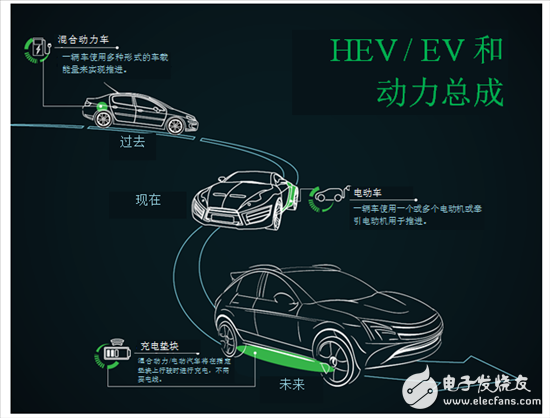Imagine a world of self-driven zero-emission electric vehicles (EVs) and road infrastructure. Imagine that the city is full of cars that can safely transport passengers to their destination, and then park the car directly in the parking space by the sensor pad itself to quickly charge it before being called again.
Thanks to a series of automotive electronics advances that TI is embarking on, this vision for the future of the car is quickly becoming a scientific fact, not a science fiction.

The impact of electronic devices in cars is growing
From the electrification of vehicle engines to higher automation, safety, comfort and convenience, advanced electronics have become a key factor in many improvements in automobiles.
At the engine level, automakers and customers are increasingly turning to various forms of electric vehicles, hybrid electric vehicles (HEVs) and electronically assisted internal combustion engines to increase gas mileage and reduce costs.
According to market analysis firm IHS AutomoTIve, the development of electric vehicles will continue to be slow, but the number will grow steadily and will account for 5% of global auto sales by 2025. Hybrid electric and petrol internal combustion engines will reach approximately 22 million vehicles in 2025, accounting for approximately 20% of global vehicle sales.
What is driving the EV revolution?
Electric vehicles not only reduce fuel consumption and emissions – they also help manufacturers develop the support technologies needed for electrification while giving consumers time to adapt. Government orders and market demand will determine the pace of this transition.
Integrated circuits (ICs) that sense conditions, drive actuators, convert signals, communicate between vehicle systems, and make decisions without driver intervention will increasingly become key automotive components.
Integrated circuits that operate in vehicles must operate under extreme conditions of voltage, current, temperature, and vibration, and they must operate reliably to keep equipment and passengers safe.
At TI, we offer a broad portfolio of innovative solutions that enable automakers to design and build more efficient, safer and more comfortable vehicles that make their customers easier to operate.
As the revolution in transportation continues, the new introduction of automotive electronics will continue to make cars more fuel efficient, safer and more convenient. Electronically assisted internal combustion engines, hybrids at all levels, and all-electric vehicles are changing pollution trends to reduce global pollution and greenhouse gas emissions.
Autopilots and electric vehicles will change the way vehicles operate, especially in cities, and will bring new business models to help provide low-emission or zero-emission and custom transportation solutions for hundreds of drivers.
I am very happy to work at TI, where we will continue to focus on researching automotive electronics and developing safer, more convenient and environmentally friendly vehicles in the future.
Guangzhou Yunge Tianhong Electronic Technology Co., Ltd , https://www.e-cigarettesfactory.com